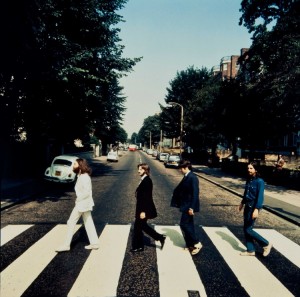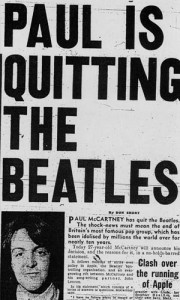
 Today is a significant date in pop/rock history. Forty-three years ago today, in 1970, Paul McCartney, almost accidentally, announced the end of The Beatles, arguably the most important group in modern musical history.
Today is a significant date in pop/rock history. Forty-three years ago today, in 1970, Paul McCartney, almost accidentally, announced the end of The Beatles, arguably the most important group in modern musical history.
The group had been splintering for some time, with George Harrison leaving in 1968, only to be coaxed back in by John Lennon, and then Lennon himself calling it quits in the early fall of 1969. The group agreed to keep silent about the split as the “Abbey Road” album was slated for release in September of 1969 and because they had other projects in the works, namely the “White Album.”
McCartney had already recorded his first solo album “Ram” and the other three tried to convince him to delay its release so that it didn’t clash with the release of the “Let It Be” album and film. An irritated McCartney then issued a Q&A to the press loaded with negative comments about The Beatles’ future as a band. These comments made the front page of the Daily Mirror on Friday, April 10, 1970 with the paper announcing that Paul had quit the band. 
The split was felt worldwide and was significant because it not only marked the end a group that literally changed the face of the music industry but it served as another indicator that the hopes and dreams of the 1960s youth culture had come to an end. Just five months earlier, the infamous free concert at Altamont Speedway that resulted in the murder of one concert-goer and the accidental deaths of three others, was in stark contrast to the “peace and love” of the Woodstock festival just four months earlier. Altamont was considered by many to be the death of the hippie generation and now, that same generation’s greatest band, the band that had sung “All You Need Is Love,” was gone. The demise of The Beatles and the violence at Altamont, as well as the continuing atrocities in Vietnam, made it very clear that the optimism and hope of the 60s youth culture was beginning to fade.
Ironically, today also marks the death of not only The Beatles as a band but also the death of one of its original members, Stuart Sutcliffe. Sutcliffe is often referred to as the “fifth Beatle” and was their original bass player. Stuart quit the band in June of 1961, while the band was playing in Hamburg, to pursue a career in painting. He studied under renowned pop artist Eduardo Paolozzi, who wrote in a report that Sutcliffe was one of his best students. Unfortunately, in early April 1962 he collapsed in the middle of an art class after complaining about headaches and on April 10, 1962, he was taken to the hospital but died in the ambulance on the way there. It was later discovered that he’d died of a brain aneurysm. He was 21 years old.
Just seven months after Sutcliffe’s death, The Beatles would have their first Number 1 single with “Please, Please Me” and the band that Sutcliffe helped start would be on their way to becoming one of the most important groups in rock history.
So, today, we feature events that pay tribute to the legacy of The Beatles, as proof that even a half a century after their formation, this great band continues to resonate with audiences young and old.
Read More…



 Arts
Arts Comedy
Comedy Event Tips
Event Tips Film
Film Food & Drink
Food & Drink Good Causes
Good Causes Music
Music News
News Radio
Radio Roller Derby
Roller Derby